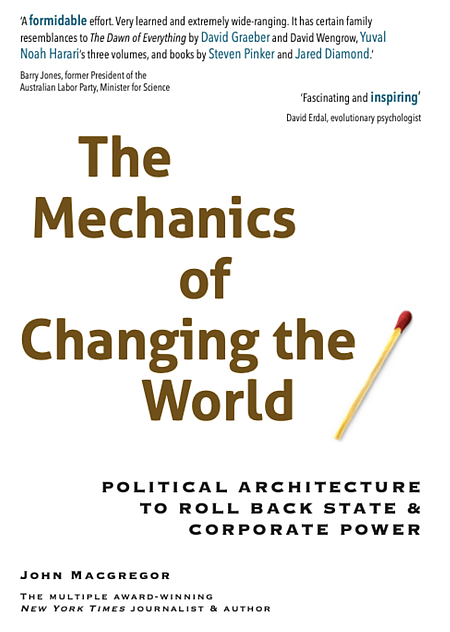Democracy is withering. A majority of people in democracies like America, France and others believe that corruption is widespread in government. How has this come about? Author John MacGregor believes it is because our constitutions are rooted in a world no living person can remember, where liberties, elections and separation of powers are defined but in the gaps there has arisen a capture by an elite which governs more for their own self-interest than for the public good.
In his book The Mechanics of Changing the World, MacGregor reminds us of the birth of recorded democracy in the 6th Century BC Athens, followed by a rebirth in the last century. But now the time has come for what he calls ‘Third Draft Democracy’.
He argues that current day democracies suffer in four interrelated ways: political money, monopoly media, skewed electoral machinery and civic alienation.

At the core of Third Draft Democracy is a Bill of Change – the subject of his book. What is refreshing about MacGregor’s book is that it’s not merely an identification of the ills of democracy and how they came about, but it goes on to propose detailed remedies to overcome them, and does so without needing to resort to left or right politics but rather to a fundamentally citizen-centric view.
It is a highly ambitious book, meticulously researched and well argued.
MacGregor’s Bill of Change addresses each of the four causative agents of democratic decline and proposes reforms with ample supporting evidence in each case.
First, the reforms would break the nexus between politics and wealth by removing political money and schemes that game the system. Specifically every citizen would allocate a small political pledge at election time (funded by a financial transactions tax), and there would be no other sources of political funding. Political advertising would be reduced to say 20% of current levels. There would be bans on top level government bureaucrats moving to the corporate sector and vice versa (excludes lesser roles and SMEs). Lobbying would be transparent and limits applied. MacGregor calls this step ‘Decontamination’ and is the first Article of his Bill of Change.
Secondly, no media company would be permitted to own more than one medium. Further, a media outlet could only own one tier in the vertical supply chain. Individual companies could be no larger than a designated size. A levy on social media would be applied. MacGregor calls this Article ‘Isegoria’, the equal right to speak and be heard publicly, and to hear all views.
Thirdly, parliamentary systems would be adopted over presidential ones, with voting to achieve proportional representation using preferential voting, universal vote by mail, and automatic voting registration. ‘Deliberative democracy’ would be introduced through citizen assemblies to make important policy choices and decisions, and/or through the use of direct democracy systems such as those used by the Swiss. MacGregor calls this Article ‘Renovating the Democratic Machinery’.
Finally, basic education in the democratic arts would be introduced to help define citizen obligations. Life context and principles would be learned through participation. This need not be tedious as demonstrated by the world’s top ranked national school system in Finland. The previous Articles would reinforce the learning and practical experience of democracy in action. MacGregor calls this Article ‘Teaching the Democratic Arts’.
So how do we get there? MacGregor suggests several mechanisms. One could be by using citizen bodies just as the Irish Republic used to prepare the way for constitutional reform. These bodies would be tasked to formulate the framework of the reforms which would then be voted on in one or more referenda.
Third Draft Democracy would be implemented and enforced by a ‘Democracy Commission’ which is neither government nor private but rather one that is established, directly elected by, and responsible to the people. It would be somewhat like an independent Electoral Commission, a kind of ‘watchdog’ with its budget constitutionally mandated.
MacGregor goes into more detail on how these reforms may get kicked off. He suggests that starting at the local level would lay the groundwork for a change of system. This can then lead to State level initiatives then National. He also describes how Third Draft Democracy initiatives could arise in non-democracies.
Finally he warns of some potential pitfalls to avoid – Don’t rely on one leader. Avoid reform becoming a ‘conservative’ or ‘liberal’ project as it will mobilze one side against the other. Keep political parties at arm’s length. Avoid violence. Don’t expand government power. Expect strong opposition.
MacGregor reminds us that since civilization got underway, we have rarely mastered fair government because we have rarely prevented the capture of institutions. MacGregor’s Bill of Change aims to overcome that weakness.
Given that one of MacGregor’s proposed reforms involves learning the Democratic Arts, we would all do well to read his book as part of that journey.
The reviewer is a co-author of Court of the Grandchildren, a novel set in 2050s America.
Main image credit: Christoph Niemann /The Daily Alternative
For posts on similar themes, consider:
Australia’s Climate is Changing
Ten Ways to Stop Disinformation
